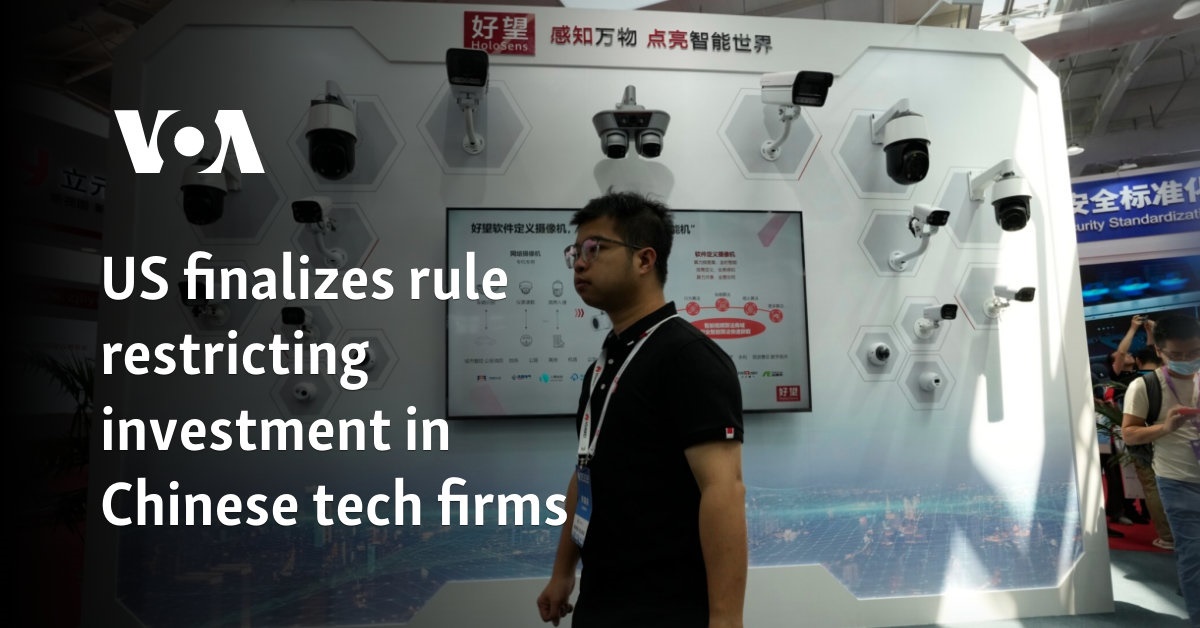The Treasury Department on Monday finalized a new rule meant to prevent U.S.-based people and companies from investing in the development of a range of advanced technologies in China, thereby preventing Beijing from accessing cutting-edge expertise and equipment.
The rule, which implements an executive order signed by President Joe Biden in 2023, focuses particularly on advanced semiconductors and microelectronics and the equipment used to make them, technology used in quantum computing, and artificial intelligence systems.
When it takes effect on January 2, the rule will prohibit certain transactions in semiconductors, microelectronics and artificial intelligence. It also establishes mandatory reporting requirements for transactions that are not banned outright.
In the field of quantum computing, the rule is more far-reaching, banning all transactions “related to the development of quantum computers or production of any critical components required to produce a quantum computer,” as well as the development of other quantum systems. Unlike the fields of AI and semiconductors, the rule does not allow for transactions that can be completed so long as they are reported to the government.
The rule also announced the creation of the Office of Global Transactions within Treasury’s Office of Investment Security, which will administer the Outbound Investment Security Program.
Justification and opposition
“Artificial intelligence, semiconductors, and quantum technologies are fundamental to the development of the next generation of military, surveillance, intelligence and certain cybersecurity applications like cutting-edge code-breaking computer systems or next generation fighter jets,” Paul Rosen, assistant secretary for investment security, said in a statement.
“This Final Rule takes targeted and concrete measures to ensure that U.S. investment is not exploited to advance the development of key technologies by those who may use them to threaten our national security,” Rosen said.
Beijing has repeatedly complained about U.S. technology policy, arguing that the U.S. is dedicated to preventing China’s rise as a global power. In a press conference on Tuesday, Chinese Foreign Ministry spokesperson Lin Jian reiterated China’s longstanding objections to U.S. efforts to withhold advanced technology from Chinese companies.
“China deplores and rejects the U.S.’s Final Rule to curb investment in China,” Lin said. “China has protested to the U.S. and will take all measures necessary to firmly defend its lawful rights and interests.”
Not just equipment
The language of the rule frequently notes that it applies to transactions with “countries of concern,” but the specific language in the text makes it plain that the targets of the rule are companies and individuals doing business in mainland China as well as the “special administrative districts” of Hong Kong and Macao.
The Final Rule’s ban on transactions is not limited to the physical transfer of finished goods and machinery in the specified fields. Explanatory documents released on Monday make it clear that several intangible benefits are also covered.
Countries of concern “are exploiting or have the ability to exploit certain United States outbound investments, including certain intangible benefits that often accompany United States investments and that help companies succeed,” an informational statement accompanying the rule said. “These intangible benefits include enhanced standing and prominence, managerial assistance, investment and talent networks, market access, and enhanced access to additional financing.”
Signaling to US companies
The onus will be on U.S. companies to comply with the new rule, Stephen Ezell, vice president for global innovation policy at the Information Technology & Innovation Foundation, told VOA.
“This is the U.S. government signaling to U.S. entities and investors that they need to think twice about making investments on the prohibited transaction side of the equation that would advance China’s capabilities in these areas,” Ezell said.
He added that the impact of the rule on investment in Chinese technology companies would have effects far beyond any reduction in funding.
“It’s not just the dollars,” he said. “A key target here is getting at the intangible benefits that come with those investments, such as managerial capability, talent networks.” He described that loss as “very significant.”
Closing loopholes
In an email exchange with VOA, Daniel Gonzales, a senior scientist at the RAND Corporation, explained that the purpose of the rule was, in part, to prevent U.S. investment firms from supporting Chinese firms in the development of certain kinds of technology.
“These rules were put in place after many episodes where U.S. [venture capital] companies helped to transfer or nurture advanced technologies that have relevant military capabilities,” Gonzales wrote. “One particular case was that of TikTok and its AI algorithms, which were developed with the help of Sequoia Capital of California.”
Sequoia did not break any laws in assisting TikTok, Gonzales said. But “it has since become known to U.S. authorities that TikTok does possess an AI algorithm that has a variety of applications, some of which have military implications. This new rule is intended to close this loophole.”
Gonzales said the U.S. government’s concern with quantum computing is also born of worries about Chinese offensive capabilities.
“Chinese researchers are working on developing quantum computer algorithms that can break encryption codes used by the U.S. government and the U.S. financial sector to protect private and confidential information,” he wrote. “China has several startup companies working to develop more powerful quantum computers. This new rule is intended to prevent the leakage of U.S. quantum technology to China through U.S. VCs.”



